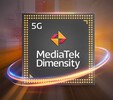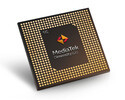MediaTek Dimensity 7020 vs MediaTek Dimensity 6020 vs UNISOC Tangula T760
MediaTek Dimensity 7020
► remove from comparison
Der MediaTek Dimensity 7020 ist ein ARM-SoC (System-on-a-Chip) der Mittelklasse, das sowohl in Smartphones als auch Tablets (hauptsächlich Android) eingesetzt werden kann. Technisch sind die Spezifikationen identisch zum älteren MediaTek Dimensity 930 (anscheinend ein Rebrand).
Er bringt ein 5G-Modem mit und unterstützt den aktuellsten Mobilfunkstandard im Dual-SIM-Modus bei beiden Karten, sodass Surfen und Telefonieren über zwei verschiedene Karten gleichzeitig möglich ist. Das SoC integriert zwei ARM-Cortex-A78-Kerne mit bis zu 2,2 GHz für anspruchsvolle Aufgaben und sechs stromsparende ARM-Cortex-A55-Kerne mit Taktraten von bis zu 2 GHz.
Der Chip besitzt ein integriertes Sub-6 GHz 5G-Modem inklusive Dual-SIM-Support, das eine maximale Download-Geschwindigkeit von bis zu 2,77 GBit/s erreichen kann. Er unterstützt Wi-Fi 5 (802.11ac) sowie Bluetooth 5.2.
Der Speichercontroller kommt mit LPDDR4x- oder LPDDR5-Arbeitsspeicher sowie UFS-3.1-Massenspeicher zurecht. Als integrierte Grafikkarte verwendet das SoC die IMG BXM-8-256, welche Displays mit 120 Hz sowie HDR10+ bei einer maximalen Auflösung von 2.520 x 1.080 Bildpunkten unterstützt.
Der MediaTek Dimensity 930 wurde von MediaTek im Mai 2022 vorgestellt und der 7020 Refresh im ersten Quartal 2023. Beide werden bei TSMC im 6-nm-Verfahren hergestellt.
MediaTek Dimensity 6020
► remove from comparison
Der MediaTek Dimensity 6020 ist ein Mittelklasse-SoC für Smartphones und Tablets mit integriertem 5G Modem. Es wurde im März 2023 vorgestellt. Die Spezifikationen sind ähnlich zum alten Dimensity 700 SoC.
Es handelt sich um eine Octa-Core-CPU mit zwei schnellen ARM Cortex-A76 Kernen mit bis zu 2,2 GHz und sechs Stromsparkernen vom Typ Cortex-A55 mit bis zu 2 GHz.
Das SoC integriert weiters eine ARM Mali-G57 MC2 Grafikkarte, ein Wi-Fi 5 Modem, einen LPDDR4x Speicherkontroller und arbeitet mit Kameras mit bis zu 64 Megapixel Auflösung zusammen.
Der Chip wird im modernen 7nm Verfahren gefertigt.
UNISOC Tangula T760
► remove from comparison
Der UniSoc T760 Tanggula ist ein Mittelklasse-SoC mit 8 Prozessorkernen in zwei Clustern. Die vier großen ARM Cortex-A76-Kerne werden so wie die kleinen vier ARM Cortex-A55-Kerne mit 2 GHz getaktet. Der schnellere UniSoc T770 bietet im Vergleich deutlich schneller getaktete A76 Cores.
Der integrierte Speicherkontroller unterstützt LPDDR4/4X mit bis zu 2133 MHz (2x 16 Bit). Der integrierte ISP unterstützt zwei Hauptkameras und 2 Nebenkameras (eine bis zu 108 MPixel). Als integrierte Grafikkarte kommt eine ARM Mali-G57 MC4 (4 Kerne) zum Einsatz. Weiters unterstützt der T760 auch AI Beschleunigung mit bis zu 4,8 TOPS Spitzenleistung.
Der Chip wird im aktuellen 6nm Prozess gefertigt und sollte eine gute Stromeffizienz aufweisen.
| Model | MediaTek Dimensity 7020 | MediaTek Dimensity 6020 | UNISOC Tangula T760 | ||||||||||||||||||||||||||||||||||||||||||||||||||||||||||||||||||||||||||||||||||||||||||||||||||||||||||||||||||||||||||||||||||||
| Series | Mediatek | Mediatek Dimensity 6000 | UNISOC | ||||||||||||||||||||||||||||||||||||||||||||||||||||||||||||||||||||||||||||||||||||||||||||||||||||||||||||||||||||||||||||||||||||
| Codename | Cortex-A78 / A55 | Cortex-A76 / A55 | Cortex-A76 / A55 | ||||||||||||||||||||||||||||||||||||||||||||||||||||||||||||||||||||||||||||||||||||||||||||||||||||||||||||||||||||||||||||||||||||
| Serie: Cortex-A76 / A55 |
|
|
| ||||||||||||||||||||||||||||||||||||||||||||||||||||||||||||||||||||||||||||||||||||||||||||||||||||||||||||||||||||||||||||||||||||
| Clock | 2000 - 2500 MHz | 2000 - 2200 MHz | 2000 - 2000 MHz | ||||||||||||||||||||||||||||||||||||||||||||||||||||||||||||||||||||||||||||||||||||||||||||||||||||||||||||||||||||||||||||||||||||
| Cores / Threads | 8 / 8 2 x 2.2 GHz ARM Cortex-A78 6 x 2.0 GHz ARM Cortex-A55 | 8 / 8 2 x 2.2 GHz ARM Cortex-A76 6 x 2.0 GHz ARM Cortex-A55 | 8 / 8 4 x 2.0 GHz ARM Cortex-A76 4 x 2.0 GHz ARM Cortex-A55 | ||||||||||||||||||||||||||||||||||||||||||||||||||||||||||||||||||||||||||||||||||||||||||||||||||||||||||||||||||||||||||||||||||||
| Technology | 6 nm | 7 nm | 6 nm | ||||||||||||||||||||||||||||||||||||||||||||||||||||||||||||||||||||||||||||||||||||||||||||||||||||||||||||||||||||||||||||||||||||
| Features | 2x ARM Cortex-A78 (2.2 GHz), 6x ARM Cortex-A55 (2 GHz), PowerVR BXM-8-256, 5G 2CC-CA FDD+TDD, Dual 5G SIM, Dual VoNR, UFS 3.1, LPDDR5 | 2x ARM Cortex-A76 (2.2 GHz), 6x ARM Cortex-A55 (2 GHz), ARM Mali-G75 MC2, APU 3.0, 5G Modem (2CC), MiraVision (4K HDR Video, 80MP Photo), Wi-Fi 5, Bluetooth 5.1, UFS 2.2, 16GB LPDDR4x Support | ISP (2 main + 2 subsidiary, 108M 4-in-1, 64M ZSL) | ||||||||||||||||||||||||||||||||||||||||||||||||||||||||||||||||||||||||||||||||||||||||||||||||||||||||||||||||||||||||||||||||||||
| iGPU | IMG BXM-8-256 | ARM Mali-G57 MP2 | ARM Mali-G57 MP4 ( - 650 MHz) | ||||||||||||||||||||||||||||||||||||||||||||||||||||||||||||||||||||||||||||||||||||||||||||||||||||||||||||||||||||||||||||||||||||
| Architecture | ARM | ARM | ARM | ||||||||||||||||||||||||||||||||||||||||||||||||||||||||||||||||||||||||||||||||||||||||||||||||||||||||||||||||||||||||||||||||||||
| Announced | |||||||||||||||||||||||||||||||||||||||||||||||||||||||||||||||||||||||||||||||||||||||||||||||||||||||||||||||||||||||||||||||||||||||
| Manufacturer | www.mediatek.com | www.mediatek.com | www.unisoc.com | ||||||||||||||||||||||||||||||||||||||||||||||||||||||||||||||||||||||||||||||||||||||||||||||||||||||||||||||||||||||||||||||||||||
| L3 Cache | 3 MB |


 Deutsch
Deutsch English
English Español
Español Français
Français Italiano
Italiano Nederlands
Nederlands Polski
Polski Português
Português Русский
Русский Türkçe
Türkçe Svenska
Svenska Chinese
Chinese Magyar
Magyar